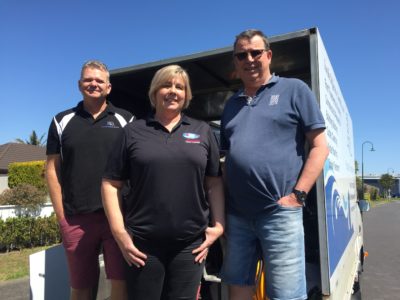
Auckland’s drought is having a major impact on local businesses whose owners say they’ve struggled to keep operating due to the city’s water crisis.
Restrictions were placed on residential and commercial water users earlier this year when the total volume of water stored in the city’s dams dropped below 50 per cent for the first time in more than 25 years.
Some commercial users were forced to cart non-potable, or recycled, water across the city to use at jobs.
But Auckland Council recently eased restrictions on them with those changes coming into force on October 12.
Restrictions on residential water users will be reviewed in late November.
Somerville resident Michelle Atwill, who runs Best Property Maintenance Services, says the drought and water restrictions have had a massive impact on her industry.
She’s managed to retain all her staff despite the circumstances, but says “it’s been tough”.
Auckland Council is the only council that bans members of her industry from using water at level one or two restrictions, Atwill says.
She believes that step was taken because of the high visibility of the water use by businesses such as hers.
“Volumes from the non-potable stations now prove we are a low water use industry.
“If we’re working behind closed doors we wouldn’t have had the same restrictions put on us.
“We had no choice but to try to get on with it but long-term the industry would not survive without water.”
Dannemora resident Daniel Noyce owns and operates Pinnacle Property Services.
He says the industry doesn’t use as much water as the public may think.
While some businesses were asked to reduce their water use by 10 per cent, his and others like them were asked to cut it by 100 per cent, he says.
“If I wash a small house I use as much water as you would in two loads of washing.
“A lot of businesses [in the industry] have had to let a lot of staff go or have closed or moved.”
Noyce says the Covid-19 pandemic was a chance for his industry to “step up” because of the need to clean and sanitise surfaces, “but that was taken away from us with the water crisis”.
“I had so many inquiries from schools but had to say I can’t bring enough water to do a whole school.”
Exterior Cleaning Industry Association president Sean White says the organisation has calculated the water taken from non-potable stations set up around Auckland is just 0.07 per cent of the city’s daily water use.
“It’s a very small amount. Compare that to residential users using a water blaster.
“They would take much longer to clean the same area and consume substantially more water.
“So compared to other industries we are very low water users. We’re just seen using it.”
Watercare spokeswoman Maxine Clayton says the organisation and council were aware of the potential impact on commercial water users of the restrictions.
But at the time they were introduced the city’s dams were less than half full and Aucklanders were using more than 400 million litres per day, she says.
“Water restrictions were introduced as a means to dampen demand while dams replenished.
“Auckland Council, together with Watercare, went to great lengths to provide free access to non-potable water at sites all over Auckland so commercial users could fill up their tanks.”
Clayton says Watercare has been working to increase the volume of water available by expanding two treatment plants and by reinstating two former water sources.
The organisation has an ongoing pipes maintenance and renewal programme as well as a proactive leak detection programme, she says.







